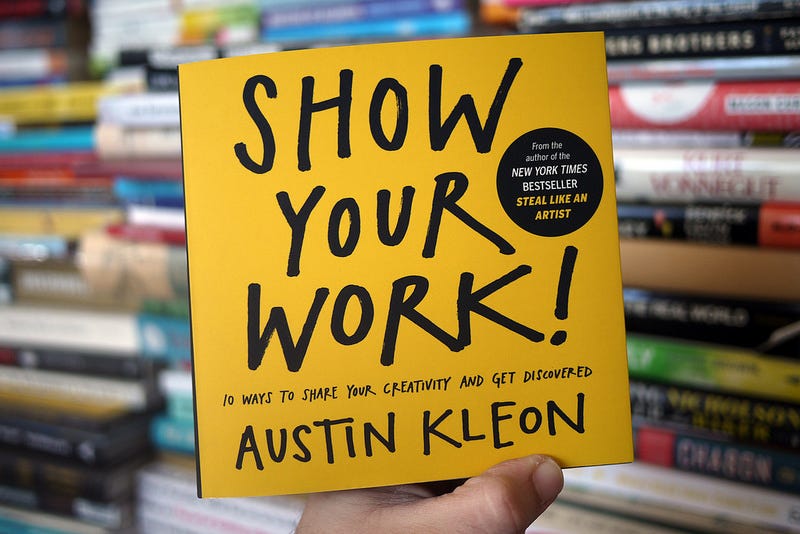Several years ago Noel’s friend and high-tech collaborator on other projects, Mike Wolf, zealously recommended that we read Austin Kleon’s Show Your Work, an inspiring book about creativity and finding an audience. It’s written for people who hate the idea of self-promotion, but want to find ways to share their creativity in a way that resonates. Noel and I liked it a lot. He called it “a compelling argument for going rogue online,” which is what Mike had in mind for us. In fact, he’s the one who pointed us to Substack as the ideal place to “show our work.” Thank you, Mike!
Kleon is the New York Times bestselling author of a trilogy of illustrated books about creativity in the digital age. His first simple but profound guideline to creativity is that you don’t have to be a genius to be creative. Think of Picasso or Beethoven in terms of being a part of a scene. Instead of thinking “genius,” think “scenius” (a term coined by musician Brian Eno), the creativity of a whole scene. Picasso came out of the art scene in Paris in the 1920s. Beethoven came out of the music scene of 18th century Vienna. Often what we think of as creativity is a mind connected to other minds. Kleon's advice is instead of fretting over the fact that you may not be a genius, think of how you can become an “interesting note in a network.”
For Kleon, sharing is an act of generosity, not selfishness. It’s putting your work out there with the thought that it might be helpful or interesting to others. He’s talking about the whole process, not simply the finished product. That’s counterintuitive for those who believe only their best effort is worthy of showing. I am one of them, and that’s among the reasons why it took me so long to say “yes” to Mike’s idea of this Substack. Noel and I have been writing this book in the middle of other commitments and responsibilities. I dream of taking my laptop to a cabin in the woods for a month with meals delivered, but that’s not an option.
Even as I write this essay, I struggle with what’s good enough to post. But Kleon has an antidote for perfectionism as well: “Think process, not product.” Conventional wisdom is that artists and writers should share only the finished work, but he contends that such thinking “made sense in a pre-digital age,” but no more. Because of social media, people who create can share their process and form a bond with their audience that simply wasn’t possible in pre-Internet times.
Both the ideas—of “scenius” and of sharing our process—not only support but indeed insist upon collaboration, a value that has undergirded our writing of Noel’s biography. Substack and its comment section give us the opportunity to extend our collaboration to include and learn from you, our readers, as we share our process and celebrate the connection that this platform makes possible. JTF
Connections
For reflection: How has your life been enriched by people who have shown their work through showing you their process? How have you shown your work? What dimensions of our process in creating this book would you like for us to share?
Check out Kleon’s first draft of Show Your Work. If you’d like to watch an engaging book interview, I recommend “One on One With - Austin Kleon,” which was originally a production of St. Louis Public Radio and is now a youtube video from Educate Today.
Vibrations
Reflect on your “scenius” as you listen to Noel’s “Facets of the Jewel”.







...and there's nothing like the world of music to demonstrate how a 'mistake' is often the beginning of something truly original!
This is good stuff. I am going to find this book.... I am a retired professor of undergraduate mathematics and the Most Helpful thing I could do for my students was to show them how I tackled a problem. The slickly presented finished examples usually daunted the young thinkers and taught most of them almost nothing. But watching me break things down and sometimes bumble around got them thinking and trying. The reason I knew to do this is that decades earlier, I had learned more from watching my music teacher figure out how to play a difficult passage than I ever learned from watching the polished performances. I figured the value would carry over to mathematics.